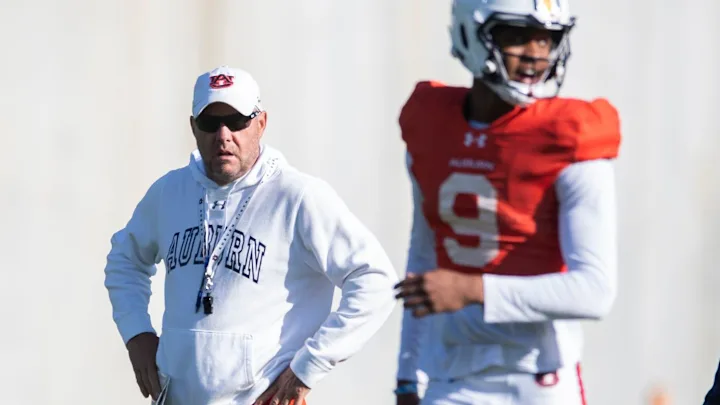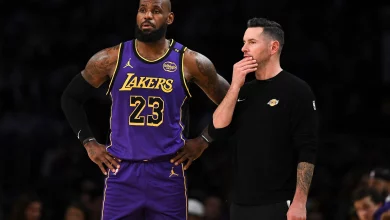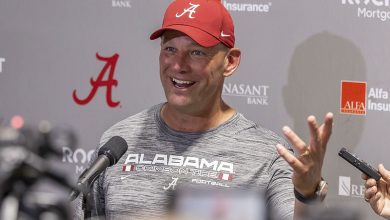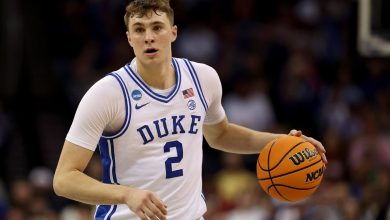Auburn Tigers QB Jackson Arnold tabbed ‘really nice stopgap’ until Hugh Freeze can move onto freshman Deuce Knight

The Auburn Tigers football program, steeped in tradition and fueled by a passionate fanbase, has long been a competitive force in the Southeastern Conference (SEC). As the Tigers navigate a period of transition, the quarterback position remains pivotal to their success and future ambitions. Recent developments have seen Jackson Arnold, a seasoned and talented quarterback, serve as a temporary solution—“a really nice stopgap”—while the coaching staff prepares to elevate freshman Deuce Knight into the starting role. This intricate process involves evaluating Arnold’s contributions, understanding Hugh Freeze’s development philosophy, and projecting the potential trajectory of Auburn’s signal-caller hierarchy.
In this comprehensive analysis, we delve into Arnold’s current role, his strengths and limitations, the rationale behind the stopgap assessment, and the developmental pathway for Knight. Additionally, we explore how Hugh Freeze’s offensive philosophy and recruiting vision shape the future of Auburn’s quarterback position.
The Context: Auburn’s Quarterback Situation
The Tigers’ quarterback position has historically been a cornerstone of their offensive success. Over the years, Auburn has produced notable quarterbacks who have left their mark both in college football and the NFL. However, recent seasons have seen instability and a search for consistent leadership under center.
The departure of key quarterbacks, injuries, and coaching changes have contributed to the uncertainty. Under Hugh Freeze, a coach renowned for his offensive ingenuity and quarterback development, Auburn aims to stabilize the position while laying the groundwork for the future. Enter Jackson Arnold, a transfer with significant potential, and Deuce Knight, a promising freshman recruited to eventually lead the Tigers.
Jackson Arnold: The “Really Nice Stopgap”
Background and Profile
Jackson Arnold, a former five-star recruit from Denton, Texas, committed to Oklahoma before transferring to Auburn. Known for his athleticism, arm strength, and football IQ, Arnold arrived with high expectations. His experience at Oklahoma, a program with a strong offensive tradition, provided him with valuable game reps and leadership qualities.
Current Role and Contributions
Arnold’s temporary role as the starting quarterback has been characterized as a “really nice stopgap,” a term that suggests he is a reliable, experienced presence filling a critical need during a transitional period. His ability to manage the offense, make plays, and provide leadership on the field has been instrumental in stabilizing Auburn’s attack.
Arnold’s strengths lie in his pocket presence, ability to extend plays with his legs, and his football instincts. His experience navigating college defenses allows him to command the huddle and execute Freeze’s offensive schemes effectively. Furthermore, Arnold’s maturity and leadership have been praised for helping to maintain team confidence amid roster upheaval.
Limitations and Areas for Growth
While Arnold offers a solid bridge at quarterback, he is not expected to be the long-term solution. His limitations include consistency in decision-making, especially under pressure, and the need to develop a more refined understanding of Freeze’s offense at Auburn. Additionally, Arnold’s mobility, while adequate, may not match that of more dynamic dual-threat quarterbacks, which could limit his upside in certain offensive schemes.
The Stopgap Role
Labeling Arnold as a “really nice stopgap” reflects a recognition of his value in the present—providing stability, veteran leadership, and a competent passing game—while also implying that his tenure is temporary. The coaching staff views Arnold as an experienced caretaker who can guide the team through this transitional phase until a more long-term solution emerges.
Hugh Freeze’s Offensive Philosophy and Development Approach
Offensive Identity
Hugh Freeze brings an aggressive, innovative offensive mindset rooted in tempo, versatility, and quarterback development. His offenses historically emphasize quick decision-making, explosive plays, and adaptability to exploit defenses.
Developing the Quarterback
Freeze’s track record demonstrates his ability to develop quarterbacks—most notably, his work with Malik Willis at Liberty and Matt Corral at Ole Miss. Freeze emphasizes tailored coaching, instilling confidence, and refining a quarterback’s decision-making and footwork.
Transition to Auburn
At Auburn, Freeze aims to implement an offense that maximizes the talents of his quarterbacks, blending pocket passing with designed runs and option principles. His approach involves nurturing young talent like Deuce Knight, helping them grow into effective leaders and playmakers.
The Path to Deuce Knight: The Future of Auburn’s Quarterback
Deuce Knight: The Prospect
Deuce Knight, a highly touted early enrollee from Alabama, joined Auburn with considerable expectations. His athleticism, arm talent, and football IQ have made him a standout among the Tigers’ freshman class. Coaches view Knight as a potential franchise quarterback capable of leading Auburn’s offense for years to come.
Development Timeline
While Arnold provides immediate stability, the coaching staff’s long-term plan involves grooming Knight to take over the reins. This process includes:
- Learning the Playbook: Knight is gradually absorbing Freeze’s offensive schemes, understanding protections, and reading defenses.
- Gaining Experience: Early reps in practice, scout team work, and limited game action help Knight develop the necessary feel and confidence.
- Physical and Mental Growth: As a young player, Knight benefits from mentorship, focused training, and game experience to refine his decision-making, mechanics, and poise.
Gradual Transition
Freeze’s approach likely involves a phased transition—initially allowing Arnold to manage the offense, while Knight observes, learns, and prepares to assume the starting role. As Knight matures and demonstrates readiness, the staff will consider giving him more responsibilities in games.
The Development Philosophy: Balancing Immediate Needs and Long-Term Success
Mentorship and Player Growth
Hugh Freeze emphasizes developing quarterbacks within a supportive environment that fosters growth. Arnold’s role as a stopgap is not just about filling a gap but also about mentoring Knight through watching and learning from an experienced leader.
Game Experience and Practice Reps
In-game opportunities for Knight will be carefully managed to ensure he gains valuable experience without jeopardizing team success. Practice reps, scout team work, and situational drills are crucial for his progression.
Mental Toughness and Poise
Freeze recognizes that mental toughness is essential for a quarterback’s success, especially at Auburn. Knight’s development involves building confidence, decision-making under pressure, and poise in the pocket—traits that Arnold has exemplified as a veteran.
Physical Development
Knight’s mechanics, mobility, and arm strength will be continuously refined through coaching and practice. Freeze’s offensive system is designed to leverage athleticism, making Knight’s mobility an asset for the offense.
The Strategic Rationale
Why a Stopgap?
Using Arnold as a stopgap allows Auburn to:
- Maintain stability and competitive performance during a transitional phase.
- Give Knight time to develop without the pressure of immediate starting expectations.
- Minimize risks associated with rushing a young quarterback into action prematurely.
Long-Term Planning
This strategy aligns with a broader vision—building a sustainable program that emphasizes player development, recruiting, and tactical growth. Freeze aims to cultivate a quarterback who can lead Auburn to SEC and national prominence.
The Broader Implications for Auburn Football
Recruiting and Future Prospects
The success of Knight and Arnold will influence recruiting strategies. Demonstrating a clear development pathway and a commitment to player growth can attract high-caliber prospects.
Offensive Identity
Implementing Freeze’s offensive principles with a young, talented quarterback like Knight will help establish an identity—one that combines explosive plays with disciplined execution.
Fan and Media Expectations
The Auburn faithful are eager to see the team compete at a high level. Having a reliable stopgap like Arnold provides confidence, while the development of Knight promises excitement for the future.
A Strategic Transition in Auburn’s Quarterback Hierarchy
The Auburn Tigers’ current quarterback scenario exemplifies strategic planning—balancing immediate needs with long-term development. Jackson Arnold’s role as a “really nice stopgap” provides stability, veteran leadership, and a platform for success in the short term. Meanwhile, Hugh Freeze’s focus on nurturing Deuce Knight aims to secure the Tigers’ future at the quarterback position.
This phased approach reflects a thoughtful understanding of player development, team chemistry, and competitive readiness. Arnold’s experience and leadership will serve as a foundation for Knight’s growth, ultimately positioning Auburn for sustained success under Freeze’s innovative offensive system.
As the season progresses, all eyes will be on Knight’s development, Arnold’s mentorship, and how effectively Auburn’s quarterback pipeline can evolve. With patience, strategic planning, and talent, the Tigers aim to build a quarterback legacy that continues their proud football tradition.









